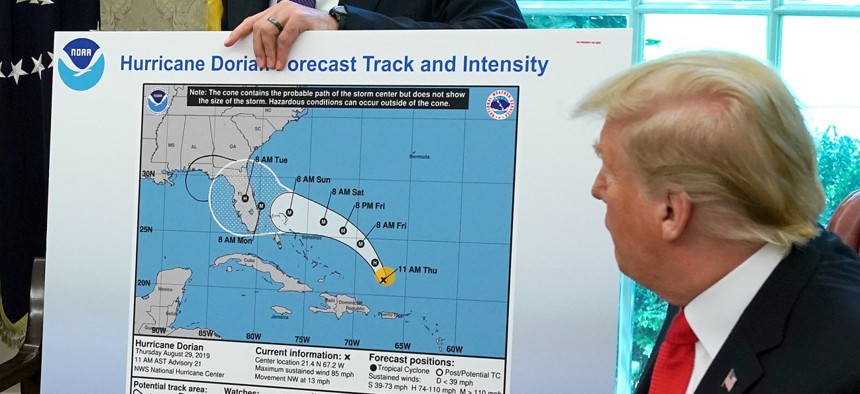
President Trump references a map that appears to have been altered with black marker while talking to reporters following a briefing from officials about Hurricane Dorian in the Oval Office at the White House September 04, 2019. The incident was dubbed "Sharpiegate." Chip Somodevilla/Getty Images file photo
To Prevent Another 'Sharpiegate,' House to Vote on Elevating Protections for Career Scientists at NOAA
An infamous incident under President Trump prompts lawmakers to look to better shield experts at NOAA from political interference.
The House is set to vote this week on a measure to boost protections for scientists at the National Oceanic and Atmospheric Administration, tasking a top official with ensuring politically motivated outcomes do not supersede objective research and data.
The introduction of the NOAA Chief Scientist Act followed NOAA falling into the spotlight for its questionable scientific process involving President Trump’s manipulation of agency hurricane data. A subsequent report into the incident found NOAA and Commerce Department officials violated the agency’s scientific integrity policies and called for better oversight and transparency for related procedures.
The bill would set new qualification requirements for the top scientist role, who is appointed by the president. It would task that individual with crafting improved scientific integrity standards and put the appointee in charge of enforcing them. The chief would have to include in those policies training to inform employees of their rights regarding scientific research and communications with the media, as well as oversight measures to ensure managers comply with integrity-related rules. In drafting the bill, lawmakers said there is currently no statutory requirement that the chief scientist comply with scientific integrity rules, nor is there a top official tasked with overseeing the policies.
The measure would elevate the standards in place to ensure career scientists can conduct their work without political interference, the lawmakers said. It would also create a new Office of the Chief Scientist, made up of career NOAA employees. The president would have to consider recommendations for the role from National Academies of Sciences, Engineering and Medicine, the NOAA Science Advisory Board or other reputable scientific groups when considering nominees for the chief scientist.
“Requiring a senior leader like the chief scientist to adhere to and uphold the scientific integrity policies of the agency, and to provide public documentation of this commitment, elevates and emphasizes the importance of scientific integrity within senior leadership at the agency,” lawmakers said in a report accompanying the bill.
The measure, which received unanimous, bipartisan support in the House Science Committee, is scheduled for a vote on the House floor as soon as Tuesday.
In anticipation of Hurricane Dorian approaching the U.S. coast in 2019, Trump tweeted that several states, including Alabama, would be hit by the storm “(much) harder than anticipated.” That sparked the National Weather Service’s outpost in Birmingham, Alabama, to tweet, “Alabama will NOT see any impacts from #Dorian. We repeat, no impacts from Hurricane #Dorian will be felt across Alabama.” Over the following days, Trump continued to insist he was correct and eventually brought out a NOAA map in the Oval Office that appeared to be altered by a marker to show Alabama was included in the storm’s projected path.
The incident was dubbed “Sharpiegate,” and NOAA subsequently released an unsigned statement that said Alabama was “clearly” in some projected paths of the storm and the Birmingham NWS erred in its tweet. NOAA officials eventually conceded political appointees at the Commerce Department played a key role in drafting the press release, leading to multiple independent reviews that found widespread violations of scientific integrity policies.
Shortly after coming into office, President Biden established the Scientific Integrity Task Force as part of his efforts to better protect career federal scientists and reverse what he said were pernicious trends under his predecessor. In January, the task force released guidelines for agencies to either develop or update their scientific integrity policies. The group specifically cited the NOAA incident and faulted the agency for maintaining a structure that allowed those responsible for it to escape any discipline.
Several groups that condemned the Trump administration’s treatment of scientists praised the NOAA bill.
“The NOAA Chief Scientist Act sets the necessary credentials for the position,” said Andrew Rosenberg, director of the Center for Science and Democracy and the Union of Concerned Scientists, when the bill was first put forward. “The chief scientist must lead efforts to ensure NOAA lives up to its scientific integrity principles and strengthens and diversifies its scientific workforce.”



